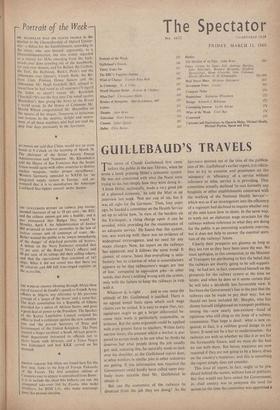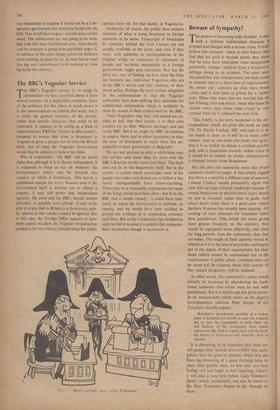GUILLEBAUD'S TRAVELS
MIIE name of Claude Guillebaud first came I before the public in the late Thirties, when he' wrote a book praising Hiller's economic system He was not concerned with what the Nazis were trying to do, but simply how they were doing it : 'I think Hitler, technically, made a very good job of a planned economy,' he told the Mail in an interview last week. 'Not our cup of tea, but it was all right for the Germans.' Then, four years ago, he headed a committee on the Health Service set up to advise how, 'in view of the burdens on the Exchequer, a rising charge upon it can be avoided, while providing for the maintenance of an adequate service.' He found that this system, too, was working well; there was no evidence of widespread extravagance, and no need for any major changes. Now, his report on the railways has appeared; and it follows the same trend. It cannot, of course, boast that everything is satis- factory; but its criterion of what is unsatisfactory appears to be that railwaymen's wages are 'out of line,' compared to equivalent jobs—in other words, that there's nothing wrong with the system, only with the failure to keep the railways in step with it.
Whatever is, is right . . and in one sense the attitude of Mr. Guillebaud is justified. There is no agreed moral basis upon which such wage claims can be settled. It is easy to argue that, say, signalmen ought to get a larger differential be- cause their work is particularly respohsible, or arduous. But the same argument could be applied with even greater force to teachers. Within fairly narrow limits. the amount which a worker is pre- pared to accept tends to be not what he thinks he deserves but what people doing the job usually get; and, assessing this,-he naturally tends to look over his shoulder, as the Guillebaud report does, at what workers in similar jobs in other industries are getting. if this information was required the Government could hardly have called upon any- body more suitable than Mr. Guillebaud to obtain it.
But can the economics of the Tailways be divorced from the job they are doing? As the
Spectator pointed out at the time of the publica- tion of Mr. Guillebaud's earlier report, it is ridicu- lous to try to examine and pronbunce on the 'adequacy' or 'efficiency' of a service without reference to what service it is providing. That committee actually declined `to visit formally any hospitals or other establishments concerned with the working of the National Health Service'— which was as if an investigation into the efficiency of a regiment had declined to inquire whether any of the men knew how to shoot. In the same way, to work out an elaborate wage structure for the railways without reference to what they are doing for the public is an interesting academic exercise, but it does not help to answer the essential ques- tion of the railways' future.
Clearly their prospects are gloomy so long as they are run as they have been since the war. We must apologise, in this connection, to the Minister of Transport for attributing to him the belief that the railways are shortly going to be self-support- ing : he had not, in fact, committed himself on the prospects for the railway system at the time we wrote; and when he does so it seems certain that he will take a decidedly less favourable view. It has been the Government's line in the past that the railways can be made to pay their way; but we should not have included Mr. Marples, who has shown himself enlightened, on transport problems, among the—now nearly non-existent—band of optimists. who still cling to the hope of a railway renaissance. That hope is dead : what is now re- quired, in fact, is a ruthless grand design to cut losses. It need not be a bar to modernisation : the railways are with us whether we like it or not for the foreseeable future, and we must do the best we can with them. But heroic measures are now required if they are not going to be a heavy drain on the country's resources; and this is something the report simply does not consider.
This kind of report, in fact, ought to be pro- duced behind the scenes, without fuss or publicity. But that would not have suited the Government; its chief anxiety was to postpone the need for action (at the time the committee was appointed it was reasonable to suppose it would not be a Con- servative government that would be faced with the bill). Now it will have to pay—in both senses of the word. The railwaymen arc not going to be satis- fied with less than Guillebaud rates, back-dated; and the taxpayer is going to be justifiably angry if, in addition to the extra money asked for Defence (with nothing to show for it), he now has to meet this big new commitment (v‘ ith nothing to show for it) for the railways.











































 Previous page
Previous page